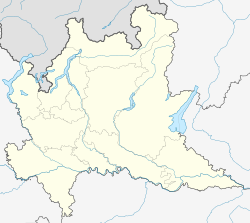
Capo di Ponte is an Italian comune in Val Camonica, province of Brescia, in Lombardy.

Coccaglio is a town and comune in the province of Brescia, in Lombardy, Italy. It is approximately 20 miles (32 km) west of Brescia and 35 kilometres (22 mi) southeast of Bergamo.
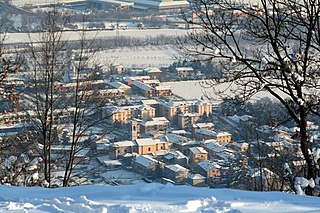
Collebeato is a town and comune in the province of Brescia, in Lombardy, Italy. It is located on the right bank of the river Mella, 5 kilometres (3.1 mi) north of Brescia.

Corzano is a town and comune in the province of Brescia, in Lombardy, Italy. As of 2011 its population was 1,397.

Ghedi is a town and comune in the province of Brescia, in Lombardy, Italy. It received the honorary title of city with a presidential decree on November 24, 2001.

Malegno is a comune in Val Camonica, province of Brescia, Lombardy, northern Italy. Malegno lies on the right bank of the river Oglio, and is crossed by the river Lanico.
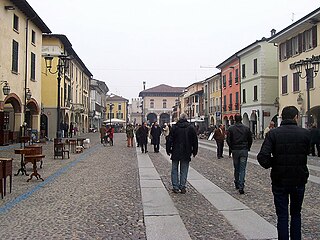
Orzinuovi is a town and comune in the province of Brescia, in Lombardy, Italy.
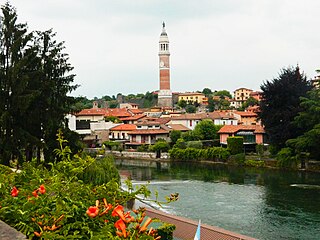
Palazzolo sull'Oglio is a city and comune in the Province of Brescia, in the region of Lombardy in northern Italy. It is located south of Lake Iseo, bordering the Province of Bergamo, and has a population of 20,208. It is the fifth largest city in the Province, after Brescia, Desenzano del Garda, Montichiari and Lumezzane.
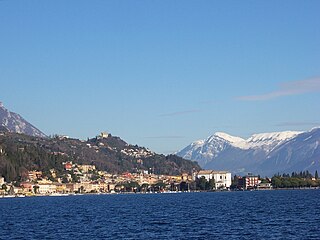
Toscolano Maderno is a town and comune on the West coast of Lake Garda, in the province of Brescia, in the region of Lombardy, northern Italy. It is located about 40 kilometres (25 mi) from Brescia.

Valdagno is a town and comune in the province of Vicenza, north-eastern Italy.

Verucchio is a comune in the province of Rimini, region of Emilia-Romagna, Italy. It has a population of about 9,300 and is 18 kilometres (11 mi) from Rimini, on a spur overlooking the valley of the Marecchia river.

Rocca di Botte is a comune and town of 860 people in the province of L'Aquila, Abruzzo, central Italy.
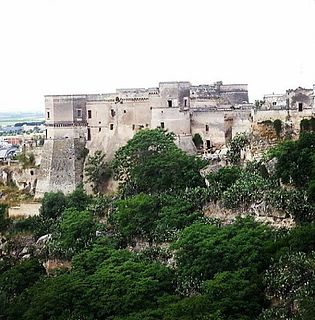
Massafra is a town and comune in the province of Taranto in the Apulia region of southeast Italy.

Nichelino is a comune (municipality) in the Metropolitan City of Turin in the Italian region Piedmont, located about 8 kilometres southwest of Turin.

Santa Margherita Ligure is a comune (municipality) in the Metropolitan City of Genoa in the Italian region Liguria, located about 35 kilometres (22 mi) southeast of Genoa, in the area traditionally known as Tigullio. It has a port, used for both tourism and fishing activities. Part of comune territory is included in the Regional Natural Park of Portofino. Santa Margherita Ligure borders the following municipalities: Camogli, Portofino, Rapallo.
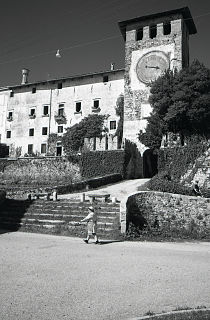
Colloredo di Monte Albano is a comune (municipality) in the Italian region Friuli-Venezia Giulia, located about 80 kilometres (50 mi) northwest of Trieste and about 14 kilometres (9 mi) northwest of Udine.
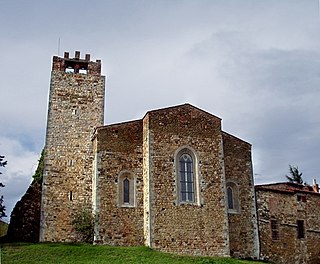
Campagnatico is a comune (municipality) in the Province of Grosseto in the Italian region Tuscany, located about 100 kilometres (62 mi) south of Florence and about 20 kilometres (12 mi) northeast of Grosseto in the valley of the Ombrone River.

Guarcino is a comune (municipality) in the Province of Frosinone in the Italian region Lazio, located about 70 kilometres (43 mi) east of Rome and about 20 kilometres (12 mi) north of Frosinone in the Monti Ernici area.
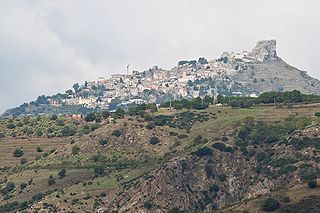
Bova is a comune (municipality) in the Province of Reggio Calabria in the Italian region Calabria, located about 120 kilometres (75 mi) southwest of Catanzaro and about 25 kilometres (16 mi) southeast of Reggio. It is one of the Greek-Bovesian speaking villages of Bovesia, one of the two Griko-speaking areas of southern Italy. The village is inscribed into I Borghi più belli d'Italia list.

Rosolini is a comune (municipality) in the Province of Syracuse, Sicily, southern Italy. It is about 200 kilometres (120 mi) southeast of Palermo and about 40 kilometres (25 mi) southwest of Syracuse. Rosolini was a town in feudal times, and was a settlement in the late Imperial Roman and Byzantine Ages. In the 15th century, Rosolini was a fief of the Platamones. It was the Moncadas, in the year of 1713, which founded the newer town of Rosolini which we see today.

